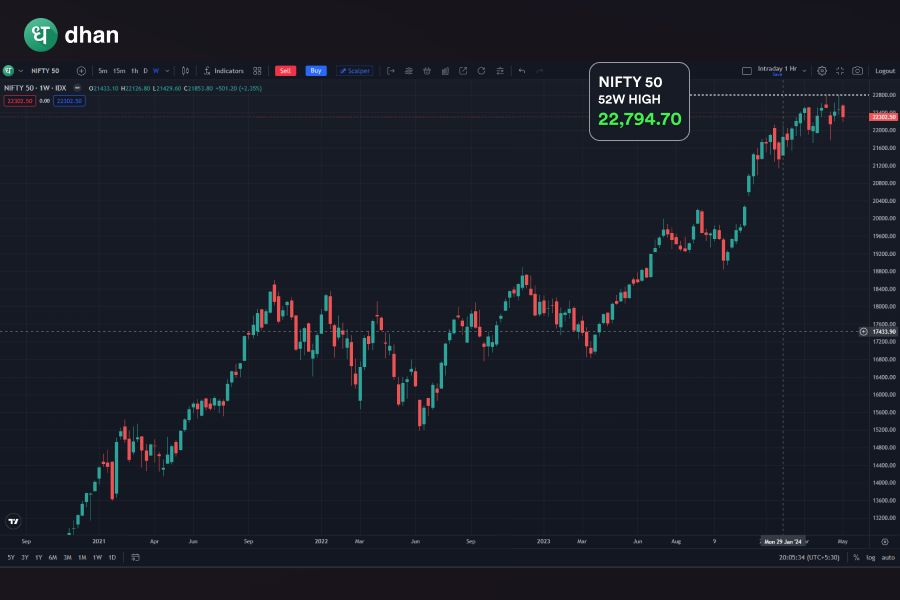Nifty 50 is a leading Indian stock market index representing the weighted average of the 50 largest companies listed on the National Stock Exchange. The Nifty 50 share price is closely monitored by traders and investors as it is a barometer for market sentiment.
Various factors impact Nifty 50 and the stock market as a whole. One such factor is the general elections. In India, general elections are known to cause stock market volatility due to multiple reasons.
Political concerns, market perception, and other factors may drive the index and its components. As a result, it is critical to understand where Nifty 50 stands once the 2024 general elections are over.
How Has Nifty 50 Reacted to General Elections in the Past?
The historical influence of general elections on Nifty 50 can be determined by examining trends before and after elections.
This will give you a sound base to understand how companies within the index, and the index itself, move during major events such as elections.
Performance of Nifty Before General Elections
The impact of pre-elections on Nifty is typically mixed. In 2004, Nifty 50 experienced negative returns, much in part due to the uncertainty around the election outcome.
The unexpected win of the Congress-led UPA, among other reasons, led to a brief market downturn. The 5-year period also saw a global catastrophe for the markets with the 2008 financial crisis in the US.
In 2009, Nifty 50 surged by 24% before the election results, driven by positive market sentiment and expectations of a stable government. This was, in part, due to the euphoria surrounding the UPA’s ability to form a government independently, coupled with significant foreign money inflows following quantitative easing in the US.
Performance of Nifty Post General Elections
Nifty has generally delivered positive returns post-election. This is because the stock market participants reposition themselves based on the election outcomes to find a way ahead.
For example, Nifty 50 soared over 40% each trading day till December 31, 2009. Positive sentiments and outlook are primarily responsible for this spurt, aided in part by the ability of the UPA to build an independent government.
Where Will Nifty 50 Be After General Elections 2024?
The Nifty 50 reached a new all-time high recently reaching Rs. 22,794.70. This upward trend can be clearly seen in the Nifty 50 chart.

This may be credited to multiple factors, including investors buying stocks across different sectors and the Bharatiya Janata Party (BJP) winning in three big states (Rajasthan, Madhya Pradesh, and Chhattisgarh) in the Assembly elections. Assembly elections are known to serve as a general indicator of the mood of the electorate and behave as a precursor to general elections in India.
India's economy is expected to grow well, and if the current government stays in power in this year's Lok Sabha elections, it could turn investor sentiments more positive, as indicated by past trends.
This is because experts think that the financial markets have already considered the positive feelings coming from the expected results of the upcoming elections over the BJP’s win.
However, predicting the exact position of the Nifty post the 2024 General Elections is challenging due to the dynamic nature of the stock market.
Some experts see the possibility of Nifty touching the levels of Rs. 23,000-25,000 by the General Elections of 2024.
However, they also believe it will be a lofty goal for the benchmark index and the market needs to discount global factors, geopolitical tensions, performance of next year’s monsoon, and interest rate trajectory globally.
Overall, there is an anticipation that Nifty may likely cross the historic Rs. 25,000 post-elections compared to the current levels of Rs. 22,300+.
Why Does Nifty Price Get Affected Post General Elections?
There are some major factors that can influence the Nifty index after the General Elections:
1. Anticipation over Election Outcome
The election outcome can significantly impact the Nifty index. For instance, after the 2014 General Elections exit poll results, when the BJP-led NDA secured a majority, the markets reacted positively.
At that time, the Nifty index hit an all-time 11,870 mark. This was attributed to market expectations of political stability and anticipated economic reforms under the new government.
However, market reactions can vary with each election’s unique circumstances.
2. Policy Continuity and Economic Reforms
Policy continuity and economic reforms are crucial factors that can influence the Nifty index. If the same government is re-elected, the market often reacts positively due to the anticipation of continued policies and reforms.
Investors gain confidence from the expectation of a stable political environment and the continuation of economic reforms.
This can lead to increased investment, driving up the Nifty index. However, any uncertainty or changes in these factors can also lead to market volatility.
3. Sector Performance
Sector performance is another key factor influencing the Nifty index. Post-elections, certain sectors like Banking, Consumer Durables, and IT often outperform others.
This is because these sectors have historically been top performers after elections. The performance of these sectors can sway the Nifty index. However, it’s important to note that sector performance can vary based on specific circumstances and policy changes.
4. Market Expectations and Assumptions
The Nifty index is highly influenced by market expectations and assumptions. Stock market participants often position themselves ahead of the elections, anticipating the outcome.
Positioning refers to the action of traders adjusting their portfolios based on expected future events. Ahead of elections, market participants often anticipate the outcome and adjust their holdings accordingly.
For instance, if they expect a certain party to win, which might favor infrastructure development, they might increase their investments in infrastructure-related stocks.
Similarly, if they anticipate policy changes that could impact IT companies, they might reduce their holdings in that sector. This repositioning can cause significant shifts in the Nifty index.
All these factors impact where Nifty stands after the general elections.
Conclusion
The Nifty 50’s performance post the 2024 General Elections will be influenced by various factors including the election outcome, government policies, investor sentiment, global market trends, and economic indicators.
Making smart choices in this kind of market requires looking closely at all these factors and making informed decisions.
Volatility tends to rise during special events such as the election, thereby increasing the need for exceptional risk management strategies.
On Dhan, users have access to Trader’s Controls - an awesome tool to put a stop to overtrading, prevent extreme loss, and keep a trading buddy informed.
Moreover, you can keep an eye on Nifty 50 with the Dhan online trading platform. It gives you up-to-the-minute market info, and advanced analysis, and it's easy to use.
This article has been produced on behalf of Dhan by ABP Digital Brand Studio.











